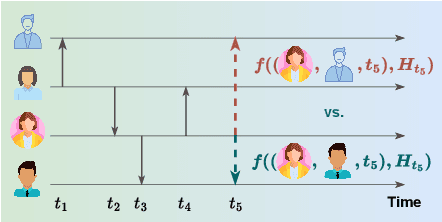Hsing-Huan Chung
Between Linear and Sinusoidal: Rethinking the Time Encoder in Dynamic Graph Learning
Apr 10, 2025



Abstract:Dynamic graph learning is essential for applications involving temporal networks and requires effective modeling of temporal relationships. Seminal attention-based models like TGAT and DyGFormer rely on sinusoidal time encoders to capture temporal relationships between edge events. In this paper, we study a simpler alternative: the linear time encoder, which avoids temporal information loss caused by sinusoidal functions and reduces the need for high dimensional time encoders. We show that the self-attention mechanism can effectively learn to compute time spans from linear time encodings and extract relevant temporal patterns. Through extensive experiments on six dynamic graph datasets, we demonstrate that the linear time encoder improves the performance of TGAT and DyGFormer in most cases. Moreover, the linear time encoder can lead to significant savings in model parameters with minimal performance loss. For example, compared to a 100-dimensional sinusoidal time encoder, TGAT with a 2-dimensional linear time encoder saves 43% of parameters and achieves higher average precision on five datasets. These results can be readily used to positively impact the design choices of a wide variety of dynamic graph learning architectures. The experimental code is available at: https://github.com/hsinghuan/dg-linear-time.git.
Novel Node Category Detection Under Subpopulation Shift
Apr 01, 2024



Abstract:In real-world graph data, distribution shifts can manifest in various ways, such as the emergence of new categories and changes in the relative proportions of existing categories. It is often important to detect nodes of novel categories under such distribution shifts for safety or insight discovery purposes. We introduce a new approach, Recall-Constrained Optimization with Selective Link Prediction (RECO-SLIP), to detect nodes belonging to novel categories in attributed graphs under subpopulation shifts. By integrating a recall-constrained learning framework with a sample-efficient link prediction mechanism, RECO-SLIP addresses the dual challenges of resilience against subpopulation shifts and the effective exploitation of graph structure. Our extensive empirical evaluation across multiple graph datasets demonstrates the superior performance of RECO-SLIP over existing methods.
 Add to Chrome
Add to Chrome Add to Firefox
Add to Firefox Add to Edge
Add to Edge